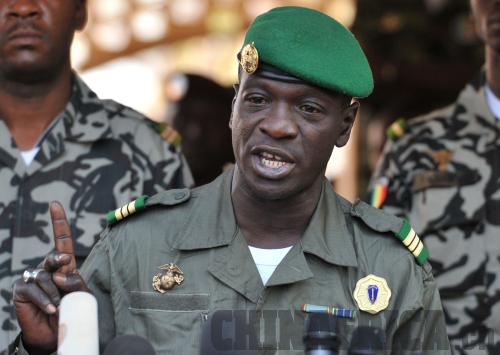|
 |
|
COUP CHIEF: Captain Amadou Haya Sanogo XINHUA/AFP |
The constitutional crisis in Mali was successfully settled when Dioncounda Traore, head of the country's National Assembly, was sworn in as the president of the interim government on April 12. As Mali is a big country in West Africa with an area exceeding 1.24 million square km that occupies an important geographical position, the successful settlement of the constitutional crisis in the country will exert positive influence in dealing with the secessionist force in its north, prevent the Al-Qaeda force from penetrating into North Africa and maintain regional peace and stability.
Successful settlement
A military coup took place in Mali on March 22 and Captain Amadou Haya Sanogo proclaimed himself the leader of the newly established National Committee for the Restoration of Democracy and State. However, only three weeks later, the situation changed dramatically with Mali restoring its constitutional state.
The Economic Community of West African States (ECOWAS) played an important role in successfully settling the coup in Mali. After the coup, the community suspended Mali's membership and launched economic and diplomatic sanctions against the country. In addition to that, ECOWAS held three special summits in Abidjan and Dakar to impose pressures on the military force that took over Malian Government. In addition, on March 29, the community announced the ultimatum, requiring the military force to hand over their powers within 72 hours; otherwise, the country's borders would be closed and the funds of Mali in the Central Bank of West African States would be frozen.
Under the heavy pressure of ECOWAS, the military force in Mali had to hand over power. Head of the country's National Assembly Dioncounda Traore became the interim president and announced to hold presidential election within 40 days after the interim government was established. On April 8, Mali President Amadou Toumany Toure resigned, paving the way for the restoration of constitutionalism and presidential elections.
Capacity improved
The successful settlement of the Mali constitutional crisis reflects the improvement of Africa's capacity to independently solve its internal crisis. With the development of African integration in recent years, the African Union (AU) and sub-regional organizations of the continent have been strengthening their efforts to build its capacity and have made great progress in building the mechanisms dealing with internal crisis.
Since 2003 the AU has been playing positive roles in many conflicts and wars in countries such as Burundi, Sudan, Cote d'Ivoire and Somalia. It also deployed peacekeeping forces in places in need, playing a positive role in maintain peace and security in Africa.
Sub-regional organizations also play important roles in solving regional crises. For instance, ECOWAS was even earlier than the AU in terms of innovating the mechanisms of maintaining regional peace and security. As early as May 1990, it established a regional body to deal with disputes and conflicts among its member states. In 1999, the community established a permanent mechanism to prevent, manage and solve conflicts. Currently, this region has established its own peacekeeping and intervention troops and is ready to deal with possible crises.
Behind the event
The successful settlement of the Mali coup first shows that it is against the people's will to unconstitutionally take over the government. After the independence of African states, the complicated ethnic contradictions, religious contradictions and backward economic development caused by the long-term colonization on the continent led to frequent military coups. During the period from the 1960s to the 1980s, a total of 280 military coups happened in African countries. Even after 2008, military coups also took place in some African countries like Mauritania, Guinea, Niger, Guinea-Bissau and Mali.
After African countries adopted multi-party democracy, unconstitutional power seizing became illegal, and the countries with coups also restored constitutionalism and presidential elections.
Meanwhile, the international community should respect Africa's efforts of independently solving their internal crisis. The successful settlement of the Mali crisis shows that the continent has the ability to solve its own problems, which should be respected by the international community. Conflicts and crises in Africa should first be solved by African people by allowing the roles of the AU and sub-regional organizations to come into play. External interference usually creates more problems in these situations.
Moreover, economic development is the key to prevent military coups. The countries that experienced military coups are usually countries with poor economic situations like Mali.
Though the constitutional crisis in Mali was successfully settled, the country still has a lot of problems. Amadou Haya Sanogo who led the coup is still in charge of the country's army; the rebellion in the north has announced independence of l'Azawad region. In addition, it is still uncertain whether the presidential election can be launched within 40 days.
(The author is the Deputy Director of African Studies Center of Shanghai Normal University) |